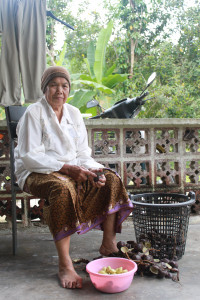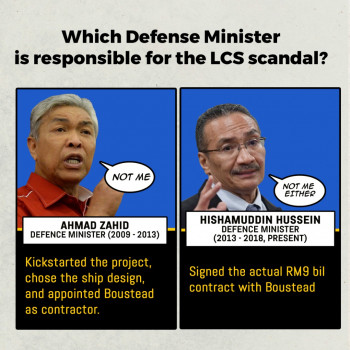By Lim Kit Siang
 There were reports that Tan Sri Taib Mahmud, who had been Sarawak Chief Minister for over 30 years since 26th March 1981 would call the state general elections and leave office once a “transition period” had established a suitable successor.
There were reports that Tan Sri Taib Mahmud, who had been Sarawak Chief Minister for over 30 years since 26th March 1981 would call the state general elections and leave office once a “transition period” had established a suitable successor.
There was however widespread cynicism and scepticism that Taib had agreed to any exit timetable, which prompted Najib to say at a rally in Bintawa, Kuching on April 11, 2011:
“I have discussed with the Sarawak CM and he has agreed to have a leadership change in Sarawak. Believe me, in me, at the right timing, this will be done.”
When pressed at the time, Taib equivocated although he finally mentioned “two years” as the timeframe of his stepping down as Sarawak Chief Minister after the Sarawak state general elections on April 16, 2011.
Taib’s two-year timeframe to step down as Sarawak Chief Minister will be up in seven months’ time but there are absolutely no signs that he is prepared and ready to honour his understanding and undertaking with Najib to effect a transition of power in Sarawak.
In fact, all the signs point to the opposite, as Taib seems to be ensconced to complete his full term as Chief Minister.
There was “a test of will” between Taib and Najib, and that Taib was “thumbing his nose at the Prime Minister, defying Najib to see who could last longer politically” as Taib was confident that Najib was too weak politically to try to enforce their understanding before the 416 Sarawak state general elections to be Sarawak Chief Minister for only two years.
Clearly, Taib has won a “hands-down” victory in the political tug-of-war with Najib.
The reason is also very simple and straightforward – the table has turned with Taib now having more political leverage vis-à-vis Najib instead of the other way round 18 months ago before the April 16, 2011 Sarawak state general elections.
Languishing in poverty
Meanwhile, where have all the wealth of Sabah and Sarawak gone to in the past five decades?
After nearly five decades, many in the Sarawak and Sabah interior even lack the most basic infrastructures to be found in the rest of Malaysia like regular electricity supply, uninterrupted piped water and good roads and bridges as well as the most basic of health and educational facilities.
Let there be a national debate and soul-searching as to how two of the richest states in Malaysia, namely Sarawak and Sabah, have been reduced in five decades to be among the poorest and the most inequitable states in the federation, as borne out by official statistics from the 2009 National Household Income Survey Report and from the EPU:
1) Incidence of Poverty Overall
Sabah is the highest in the country at 19.7%
Sarawak is the third highest in the country at 5.3% (equal with Kedah). Perlis is 2nd at 6.0%.
2) Incidence of Rural Poverty
Sabah is the highest in the country at 32.8%
Sarawak is the 2nd highest at 8.4%
After nearly five decades in Malaysia, there are at least four “massive” in Sarawak and Sabah – massive corruption, massive cronyism, massive landlessness and massive poverty.
After 49 years in Malaysia, Sarawak is afflicted with the curse of corruption, Land (NCR) injustices, Infrastructure backwardness and Borneanisation (breach) while Sabah is afflicted by the additional curse of illegal immigrants.
1. Corruption
Although Fighting Corruption is one of the priority six National Key Result Areas (NKRA) of Najib’s Government Transformation Programme (GTP), Malaysia’s corruption has gone from bad to worse in the past three years as tracked by Transparency International’s annual Corruption Perception Index.
In Malaysia, Sarawak and Sabah are two of the top states where corruption is most rampant and intractable.
2. Land (NCR) injustices
The second major issue in Sarawak and Sabah five decades after the formation of Malaysia is the plight of the Dayaks of Sarawak and the Kadazan Dusun Muruts (KDMs) over Native Customary Rights (NCR) land.
As the Kuching High Court judge, Justice Linto Albert said in his judgment in the landmark “Pantu” NCR case:, “These are cries for justice because one cannot simply throw one’s hands in the air and say that is how life is”!
3. Infrastructure (backwardness)
Both Sarawak and Sabah are states with rich natural resources, whether oil, gas, or timber, but the wealth of the state have been hijacked by BN leaders and their cronies instead of being ploughed back to ensure that the people in two states enjoy the most basic of infrastructure resources – instead of the scandalous situation in many places in the two states, where there are water pipes without water, electric poles without power supply or hospitals without doctors.
4. Borneanisation (breach)
Barisan Nasional’s failure to honour the “Borneanisation” undertaking contained in the 20/18-Point Agreements was recently highlighted by the proposal by Tun Zaki Azmi, chairman of the Special Review Commission on Civil Service Transformation, to lower the requirements for Dayaks and ethnic minority groups to enter the civil service so as to address the imbalance of racial composition within the civil service.
Zaki must be thanked for highlighting the failure of the Barisan Nasional government to implement Borneanisation in Sarawak as promised in the 18-Point Agreement in the past five decades, resulting in the sense of grievance, marginalisation and discrimination by the Dayak and ethnic minority groups with regard to the civil service.
5. Illegal Immigrants
The Prime Minister, Datuk Seri Najib Razak has taken six months to announce the members and terms of reference of the Royal Commission of Inquiry into illegal immigrants (RCIII) in Sabah.
There are no signs that the RCIII has started work or its members have been presented with their Instruments of Appointment.
This raises the serious question whether the RCIII would be another meaningless Public Relations exercise.
The theme of the 49th Malaysia Day is “Janji Ditepati” but it is clear that as far as Sarawak and Sabah are concerned, the promises for the establishment of Malaysia 49 years ago had not been fulfilled. – The Rocket



